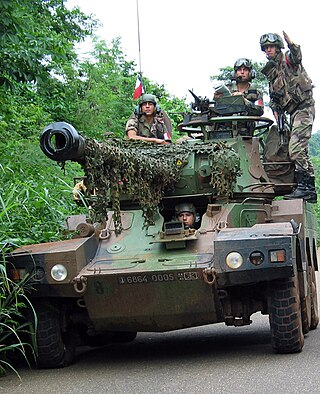
United Nations Security Council Resolution 1933, adopted unanimously on June 30, 2010, after reaffirming resolutions 1893 (2009), 1911 (2010) and 1924 (2010) on the situation in Côte d'Ivoire and Resolution 1885 (2009) on the situation in Liberia, the Council extended the mandate of the United Nations Operation in Côte d'Ivoire (UNOCI) and supporting French forces until December 31, 2010, and expanded UNOCI's mandate with provisions to strengthen its capacity to consolidate stability in the country.

United Nations Security Council resolution 1458, adopted unanimously on 28 January 2003, after reaffirming Resolution 1408 (2002) on the situation in Liberia, and recognising the importance of implementing Resolution 1343 (2001), the Council re-established an expert panel to monitor the implementation of sanctions against the Liberian government including an arms embargo, travel ban for officials, and prohibitions on the import of its rough diamonds.

United Nations Security Council resolution 1478, adopted unanimously on 6 May 2003, after recalling resolutions 1132 (1997), 1171 (1998), 1306 (2000), 1343 (2001), 1385 (2001), 1395 (2002), 1400 (2002), 1408 (2002), 1458 (2003), 1467 (2003) and others on the situation in Liberia, the Council extended sanctions against the Liberian government for an additional period of twelve months until 7 May 2004 and imposed a ban on imports of its timber for ten months.

United Nations Security Council resolution 1521, adopted unanimously on 22 December 2003, after recalling all previous resolutions on the situation in Liberia and West Africa, the council established a monitoring body to oversee international sanctions against Liberia. It was the final Security Council resolution adopted in 2003.

United Nations Security Council Resolution 1946, adopted unanimously on October 15, 2010, after recalling previous resolutions on the situation in Côte d'Ivoire, including resolutions 1880 (2009), 1893 (2009), 1911 (2010) and 1933 (2010), the Council extended sanctions against the country, including an arms embargo and ban on the trading of diamonds, for a further six months.

United Nations Security Council resolution 1572, adopted unanimously on 15 November 2004, after recalling Resolution 1528 (2004) on the situation in Côte d'Ivoire, the council imposed an arms embargo on the country following recent violence and threatened further sanctions if Ivorian parties did not comply with their political commitments.

United Nations Security Council Resolution 1962, adopted unanimously on December 20, 2010, after recalling previous resolutions on the situation in Côte d'Ivoire, including resolutions 1893 (2009), 1911 (2010), 1924 (2010), 1933 (2010), 1942 (2010), 1946 (2010) and 1951 (2010), the Council extended the mandate of the United Nations Operation in Côte d'Ivoire (UNOCI) until June 30, 2011 and urged all Ivorian parties to respect the outcome of the presidential election and the recognition of Alassane Ouattara as president.

United Nations Security Council Resolution 1975, adopted unanimously on March 30, 2011, after recalling previous resolutions on the situation in Côte d'Ivoire, including resolutions 1572 (2004), 1893 (2009), 1911 (2010), 1924 (2010), 1933 (2010), 1942 (2010), 1946 (2010), 1951 (2010), 1962 (2010), 1967 (2011) and 1968 (2011), the Council demanded that Laurent Gbagbo step down as President and imposed sanctions on him and his close associates.

United Nations Security Council Resolution 1980, adopted unanimously on April 28, 2011, after recalling previous resolutions on the situation in Côte d'Ivoire, including resolutions 1880 (2009), 1893 (2009), 1911 (2010), 1933 (2010), 1946 (2010), 1962 (2010) and 1975 (2011), the Council extended an arms embargo, ban on the trade of diamonds and targeted financial and travel sanctions on Ivorian officials until April 30, 2012.

United Nations Security Council Resolution 1643, adopted unanimously on 15 December 2005, after recalling previous resolutions on the situation in Côte d'Ivoire, the Council extended an arms embargo and travel and financial restrictions against the country until 15 December 2006, and included a ban on the trade of diamonds.

United Nations Security Council Resolution 1708, adopted unanimously on September 14, 2006, after recalling previous resolutions on the situation in Côte d'Ivoire, particularly resolutions 1572 (2004), 1584 (2004), 1633 (2005) and 1643 (2005), the Council prolonged the mandate of an expert group monitoring an arms embargo against the country until mid-December 2006.

United Nations Security Council Resolution 1727, adopted unanimously on December 15, 2006, after recalling previous resolutions on the situation in Côte d'Ivoire, the Council renewed an arms and diamond embargo on the country until October 31, 2007.

United Nations Security Council Resolution 2000, adopted unanimously on July 27, 2011, after recalling previous resolutions on the situation in Côte d'Ivoire, including resolutions 1933 (2010), 1942 (2010), 1951 (2010), 1962 (2010), 1967 (2011), 1968 (2011), 1975 (2011), 1980 (2011), 1981 (2011) and 1992 (2011), and Resolution 1938 (2010) on the situation in Liberia, the Council extended the mandate of the United Nations Operation in Côte d'Ivoire (UNOCI) until July 31, 2012.
United Nations Security Council Resolution 1761 was unanimously adopted on 20 June 2007.

United Nations Security Council Resolution 1782 was unanimously adopted on 29 October 2007.
United Nations Security Council Resolution 1893 was unanimously adopted on 29 October 2009.
United Nations Security Council Resolution 1819 was unanimously adopted on 18 June 2008.
United Nations Security Council Resolution 1826 was unanimously adopted on 29 July 2008.

United Nations Security Council Resolution 2025 was unanimously adopted on 14 December 2011.













